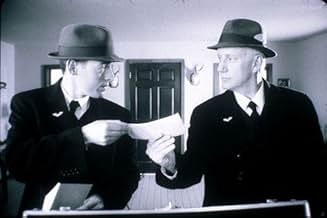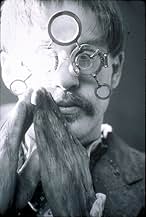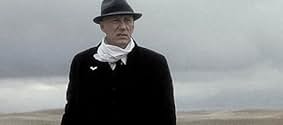Northfork
- 2003
- Tous publics
- 1h 43min
NOTE IMDb
6,2/10
5,6 k
MA NOTE
Ajouter une intrigue dans votre langueSet in 1955, the residents of a small Montana community are forced to move their homes to make way for a new dam.Set in 1955, the residents of a small Montana community are forced to move their homes to make way for a new dam.Set in 1955, the residents of a small Montana community are forced to move their homes to make way for a new dam.
- Récompenses
- 3 victoires et 3 nominations au total
Josh Barker
- Matt
- (as Joshuin Barker)
Mike J. Regan
- Flaco
- (as Mike Regan)
Histoire
Le saviez-vous
- AnecdotesMr Stalling says that he is waiting for a sign from God, when Walter O'Brien visits him at the ark. Walter imparts a tale about when the water has risen, men will come by in a boat to take him and the two Mrs Stallings's to safety. They will not go, because they are waiting for a sign and they will drown. And God will say, I sent you a boat, what more did you want? This story also appears in the The West Wing season one episode "Take This Sabbath Day" and is told by the Karl Malden character, Father Thomas Cavanaugh.
- GaffesWhen Eddie and Arnold pay a visit to Jigger, after he stops shooting at them, Eddie and Arnold approach him. Jigger is sitting in a chair and holding a shotgun on his lap and not moving. A few shots later, the shotgun is in upright position with the butt on the ground. After they look at Jigger's feet, there's no sign of the shotgun so he must be holding it on his lap, again.
- Citations
Father Harlan: We are all angels. It is what we do with our wings that separates us.
- Crédits fousJohn Tuell special thanks
- Bandes originalesAlways Late (With Your Kisses)
Performed by Lefty Frizzell
Written by Lefty Frizzell and Blackie Crawford
Courtesy of Columbia Records
By arrangement with Sony Music Licensing
Commentaire à la une
Never having seen a Polish brothers movie, I approached this with no expectations.
Somewhere in Montana in 1952 (though everything suggests an earlier date and the cars, as usual, are too perfect looking), a plain is to be flooded by a dam and a team of men in black suits is sent out to coax the few recalcitrant remaining inhabitants to vacate the properties. Each pair of evacuators is supposed to be awarded one and a half acres of prime lakefront property if they can prove that 65 locations assigned to them have been vacated. One team is James Woods (as Walter O'Brian) and his son Willis (Mark Polish). They're also supposed to remove Wood's character's wife's coffin because graves are supposed to be dug up to prevent the coffins' floating up in the flooded land. Needless to say, this makes little literal sense: the references here are to the American frontier mentality, to imperialism, land grabbing, materialism, and impiety, which the Polish brothers are impressionistically dealing with throughout this strange and highly allegorical film.
Meanwhile Nick Nolte is Father Harlan, a deranged priest running a decrepit orphanage to which a fleeing couple return a small boy they adopted earlier (Duel Farnes, who is fine) because, they say, he was `defective,' being sick all along, and is now too sick to travel.
Much of what follows revolves around the boy and may constitute his dying delirium or fantasy that he is an angel. He meets Daryl Hannah (Flower Hercules) in a graveyard in a wig and Elizabethan costume and goes back with her to see her pals, Cup of Tea (Robin Sachs, also in Elizabethan drag), Happy (Anthony Edwards, with a bizarre complex of adjustable spectacles on), and Cod (Ben Foster, a wordless young man in a bejeweled cowboy hat), and begs them to take him away from this place with them 1,000 miles away, he insists. They bargain over the distance: this may constitute the denial and bargaining of the dying person.
At its center the film cuts back and forth with lugubrious regularity between this scene, in which the boy tries to claim he has scars from where he used to have wigs and a halo (Cup of Tea is unconvinced, Hannah is weepily sympathetic, Happy is scientifically neutral, and Cod is mute) and scenes focused either exclusively on the band of evacuators or, as the film progresses, on them in encounters, variously hostile, fearful, or unfriendly, between them and the stubborn or oblivious holdouts on the land. One team is shot at, their car nearly demolished. Woods and son deal with a man with two wives who's built an ark. They fail to convince all three to leave, and, having evidence of only 64 evacuations, receive no land document.
Nick Nolte all the while is seen trying to save the boy, whom at one point he offers to Kyle McLaughlin and wife (Mr. and Mrs. Hope: this begins to sound like Pilgrim's Progress), but they aren't allowed to view the boy up close, only through a window, so they leave empty-handed (Hope without Faith thus disappointed). Nolte, Father Harlan, also goes to a pharmacist and gets antibiotics which he injects in the boy; he bathes him, reads to him, etc., but all efforts fail and the boy dies, apparently. Meanwhile scenes of the boy with Daryl Hannah et al. continue. In the end they all fly away in a big plane just like the little one in the boy's lap. Cod is his co-pilot.
Much is made of a set of putative `angel's wings,' big snowy white bird's wings which inexplicably are carried around in a large suitcase and shown both to the man with two wives and to Hannah and company.
Though no doubt enormously puzzling and open to many interpretations, it must be said that compared to something like Alejandro Joderovsky's El Topo, which this inexplicably reminded me of, Northfork makes much coherent narrative sense. Somehow the apocalyptic mood and the presence of dubious priests, spectral landscapes, and semi-mythological characters also bring Cormac McCarthy to mind, but the movie lacks McCarthy's vivid regional character and colloquial down home talk.
What it all means is more than I can venture to say in any more detail here. The tedium of the pacing might be more unfortunate if it were not to some extent relieved by an omnipresent sense of humor and also by a loyal and able cast and a stunning cinematography that combines colorless dimness with exquisite clarity in ways that heighten the pervasive sense of the surreal.
There is no doubt at all that the Polish brothers are originals. If hip young people and art film cultists like this film as much as Roger Ebert (who inexplicably believes the loquacious and visually acute Happy to be both blind and mute), Northfork will be on some level a stunning success. To many it is likely to remain arid and incomprehensible . . .and not sexy and scary like David Lynch. But the vision is unique -- and not as incomprehensible as it may seem.
Somewhere in Montana in 1952 (though everything suggests an earlier date and the cars, as usual, are too perfect looking), a plain is to be flooded by a dam and a team of men in black suits is sent out to coax the few recalcitrant remaining inhabitants to vacate the properties. Each pair of evacuators is supposed to be awarded one and a half acres of prime lakefront property if they can prove that 65 locations assigned to them have been vacated. One team is James Woods (as Walter O'Brian) and his son Willis (Mark Polish). They're also supposed to remove Wood's character's wife's coffin because graves are supposed to be dug up to prevent the coffins' floating up in the flooded land. Needless to say, this makes little literal sense: the references here are to the American frontier mentality, to imperialism, land grabbing, materialism, and impiety, which the Polish brothers are impressionistically dealing with throughout this strange and highly allegorical film.
Meanwhile Nick Nolte is Father Harlan, a deranged priest running a decrepit orphanage to which a fleeing couple return a small boy they adopted earlier (Duel Farnes, who is fine) because, they say, he was `defective,' being sick all along, and is now too sick to travel.
Much of what follows revolves around the boy and may constitute his dying delirium or fantasy that he is an angel. He meets Daryl Hannah (Flower Hercules) in a graveyard in a wig and Elizabethan costume and goes back with her to see her pals, Cup of Tea (Robin Sachs, also in Elizabethan drag), Happy (Anthony Edwards, with a bizarre complex of adjustable spectacles on), and Cod (Ben Foster, a wordless young man in a bejeweled cowboy hat), and begs them to take him away from this place with them 1,000 miles away, he insists. They bargain over the distance: this may constitute the denial and bargaining of the dying person.
At its center the film cuts back and forth with lugubrious regularity between this scene, in which the boy tries to claim he has scars from where he used to have wigs and a halo (Cup of Tea is unconvinced, Hannah is weepily sympathetic, Happy is scientifically neutral, and Cod is mute) and scenes focused either exclusively on the band of evacuators or, as the film progresses, on them in encounters, variously hostile, fearful, or unfriendly, between them and the stubborn or oblivious holdouts on the land. One team is shot at, their car nearly demolished. Woods and son deal with a man with two wives who's built an ark. They fail to convince all three to leave, and, having evidence of only 64 evacuations, receive no land document.
Nick Nolte all the while is seen trying to save the boy, whom at one point he offers to Kyle McLaughlin and wife (Mr. and Mrs. Hope: this begins to sound like Pilgrim's Progress), but they aren't allowed to view the boy up close, only through a window, so they leave empty-handed (Hope without Faith thus disappointed). Nolte, Father Harlan, also goes to a pharmacist and gets antibiotics which he injects in the boy; he bathes him, reads to him, etc., but all efforts fail and the boy dies, apparently. Meanwhile scenes of the boy with Daryl Hannah et al. continue. In the end they all fly away in a big plane just like the little one in the boy's lap. Cod is his co-pilot.
Much is made of a set of putative `angel's wings,' big snowy white bird's wings which inexplicably are carried around in a large suitcase and shown both to the man with two wives and to Hannah and company.
Though no doubt enormously puzzling and open to many interpretations, it must be said that compared to something like Alejandro Joderovsky's El Topo, which this inexplicably reminded me of, Northfork makes much coherent narrative sense. Somehow the apocalyptic mood and the presence of dubious priests, spectral landscapes, and semi-mythological characters also bring Cormac McCarthy to mind, but the movie lacks McCarthy's vivid regional character and colloquial down home talk.
What it all means is more than I can venture to say in any more detail here. The tedium of the pacing might be more unfortunate if it were not to some extent relieved by an omnipresent sense of humor and also by a loyal and able cast and a stunning cinematography that combines colorless dimness with exquisite clarity in ways that heighten the pervasive sense of the surreal.
There is no doubt at all that the Polish brothers are originals. If hip young people and art film cultists like this film as much as Roger Ebert (who inexplicably believes the loquacious and visually acute Happy to be both blind and mute), Northfork will be on some level a stunning success. To many it is likely to remain arid and incomprehensible . . .and not sexy and scary like David Lynch. But the vision is unique -- and not as incomprehensible as it may seem.
- Chris Knipp
- 10 juil. 2003
- Permalien
Meilleurs choix
Connectez-vous pour évaluer et suivre la liste de favoris afin de recevoir des recommandations personnalisées
- How long is Northfork?Alimenté par Alexa
Détails
- Date de sortie
- Pays d’origine
- Site officiel
- Langue
- Aussi connu sous le nom de
- Нортфорк
- Lieux de tournage
- Sociétés de production
- Voir plus de crédits d'entreprise sur IMDbPro
Box-office
- Budget
- 1 900 000 $US (estimé)
- Montant brut aux États-Unis et au Canada
- 1 420 578 $US
- Week-end de sortie aux États-Unis et au Canada
- 61 481 $US
- 13 juil. 2003
- Montant brut mondial
- 1 599 804 $US
- Durée1 heure 43 minutes
- Couleur
- Mixage
- Rapport de forme
- 2.39 : 1
Contribuer à cette page
Suggérer une modification ou ajouter du contenu manquant




































